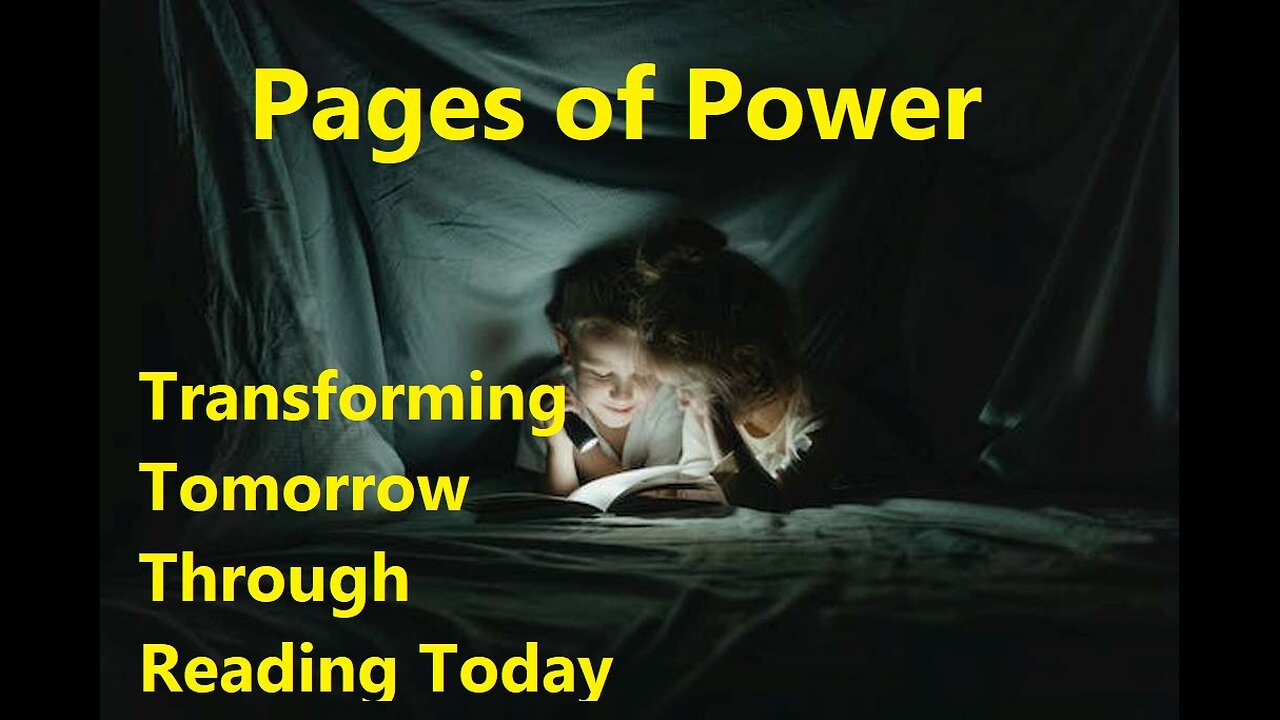Premium Only Content

Pages of Power: Transforming Tomorrow Through Reading Today
1. Technological Distractions: The pervasive use of smartphones, tablets, and other electronic devices has led to children spending more time on screens, diverting their attention away from traditional reading activities.
2. Lack of Role Models: Children often mimic the behavior of adults around them. If parents or caregivers are not avid readers, children may not see the importance of reading and may not develop a reading habit.
3. Busy Lifestyles: Over-scheduled routines with numerous extracurricular activities and homework leave children with limited leisure time. Reading may be perceived as a low priority in comparison to other activities.
4. Instant Gratification Culture: In an era of quick information access and instant gratification, some children may find the slower-paced process of reading books less appealing than more immediate forms of entertainment.
5. Educational System Pressure: An education system focused heavily on standardized testing and academic achievement might prioritize rote learning over fostering a love for reading, leading children to associate reading with a chore rather than enjoyment.
6. Limited Access to Books: Economic factors or living in areas with limited access to libraries and bookstores can hinder children's exposure to a variety of reading materials.
7. Preference for Visual Media: The rise of visually stimulating media, such as video games and streaming services, may attract children more than the immersive world of books, contributing to a decline in reading interest.
8. Peer Influence: In some cases, children may be influenced by peers who do not value or engage in reading, leading to a social stigma around being a reader.
9. Ineffective Reading Programs: If reading programs at schools are not engaging or fail to capture the interests of children, they may not develop a positive attitude towards reading.
10. Unawareness of Future Losses: Children may not realize the long-term consequences of not cultivating strong reading skills. Poor reading habits can impact academic success, critical thinking abilities, and overall cognitive development, potentially limiting future career opportunities and personal growth.
The losses children may not see in the future include missed chances for intellectual stimulation, reduced vocabulary and communication skills, diminished creativity, and a potential disadvantage in academic and professional pursuits that rely on strong reading abilities.
-
 LIVE
LIVE
I_Came_With_Fire_Podcast
14 hours agoNASA Blocks China, TPUSA BOOSTED, Chinese Spamoflauge, & Factional Division
310 watching -
 33:40
33:40
Jamie Kennedy
6 hours agoEp 222 Processing the Loss of Charlie Kirk | HTBITY with Jamie Kennedy
56.5K17 -
 1:32:05
1:32:05
Badlands Media
21 hours agoAltered State S3 Ep. 46: Tactical Nukes, Thermite, and the 9/11 Puzzle
70.1K8 -
 9:18
9:18
ARFCOM News
11 hours ago $1.96 earnedNSSF "Celebrates" ATF Partnership | Glocks BANNED | Redundant Spooky Boi Ban
36.7K9 -
 13:09:13
13:09:13
LFA TV
19 hours agoLFA TV ALL DAY STREAM - WEDNESDAY 9/17/25
307K61 -
 1:00:00
1:00:00
BEK TV
1 day agoAPRIL LUND: FAITH, FOCUS, AND THE ROAD TO THE 2028 OLYMPIC MARATHON
22.7K -
 37:15
37:15
Stephen Gardner
5 hours ago🔥Trump ERUPTS After Obama’s Charlie Kirk Comments!
37.2K71 -
 13:40:35
13:40:35
Total Horse Channel
17 hours ago2025 WDAA Western Dressage World Championship Show | Day Two | Arena One
27K -
 1:14:40
1:14:40
Glenn Greenwald
7 hours agoThe Right Wages Its Own Cancel Culture War: Lee Fang, Thomas Chatterton Williams, and Leighton Woodhouse on the State of Civil Discourse and More | SYSTEM UPDATE #517
171K80 -
 1:03:04
1:03:04
BonginoReport
8 hours agoBomb Squad Investigates Package at TPUSA HQ - Nightly Scroll w/ Hayley Caronia (Ep.136)
209K91